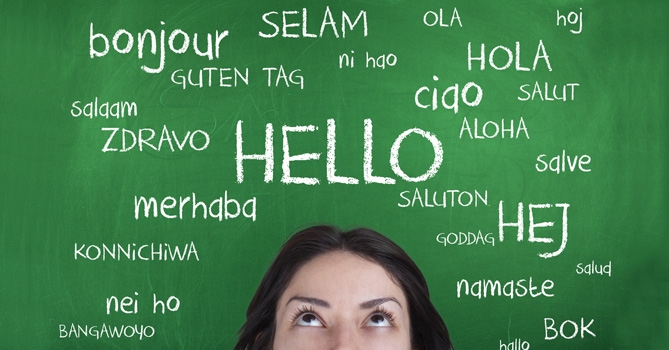Greetings are the first thing that we exchange with people from other cultures such as ones who do not speak our language or ones who are from a different country or perhaps a different part of the same country itself. It is the pleasant demeanor and a smiling face that helps us strike a conversation with people we know nothing about and, if it is meant to be, create a relationship that can stand the test of time and last for ages. How people greet others tends to differ on the basis of cultures but something that always works is a hello. This word is the veritable ice breaker, something that gets two completely different people, unknown to each other, started and have a conversation they can always cherish.
How to Say Hello in Chinese
In Mandarin the standard way of saying hello is ni hao. The formal greeting is nin hao. In the phone Mandarin-speakers greet each other by saying wei. In Cantonese, people say neih hou and over the phone it is wai. In Hakka, people say ngi ho or ngi ho mo. The over-the-phone greeting is oi. Shanghainese Chinese speakers greet each other with nong hao. In case they are greeting a lot of people, they say daka hoi, which means ‘hello everybody’. In case they want to ask if someone has eaten or not, they say ve qik gu va. In Taiwanese Chinese people say li-ho, in case of one person and lin-ho in case of more than two people. Over the phone they greet each other with oe. In Teochew Chinese the greeting for hello is leu ho.
How to Say Hello in Spanish
In conventional Spanish the word for hello is hola. Over the phone there are a number of greetings such as digal, bueno, digamel, hola, si, and alo. In Basque, a language spoken in Spain, as well as France, people say kaixo to mean hello. In Catalan, a language spoken in Spain, people say hola or bon dia to greet people. The greetings over the phone are hola, si, and digui.
How to Say Hello in Hindi
In Hindi, a language spoken primarily in northern India as well other parts of the country – it also happens to be one of the official languages of India – people either say namaste or namaskar to greet people. Over the phone they say hello.
How to Say Hello in Arabic
In modern standard Arabic there are three words, which mean hello. The general way is as-salam alaykum. If someone greets someone respectfully they say wa’alaykum as-salam and the informal greeting is marhaban. Over the phone people say allo. Egyptian Arabic has five words for hello. The normal words are is salam ‘alaykum, and ahlan wa sahlan. The respectful utterances are wa’alaykum is-salam, and ahlan beek. In Lebanese Arabic people say hello with marhaba. In Moroccan Arabic the word for hello is ssalamu ‘lekum and the greeting over phone is alu.
How to Say Hello in Portuguese
In standard Portuguese ola stands for hello and over the phone people greet each other with several phrases and words such as esta la, estou, estou sim, and halo. In Brazilian Portuguese people use words and phrases such as oi, tudo certo, e ai, opa, and tudo bem to greet each other. Over the phone they say alo.
How to Say Hello in Bengali
In Bengali, a language that has the same roots in Sanskrit, the word for hello is nomoskar. However, this word is primarily used by Hindus and non-Muslims. Muslims greet others with assalamu alaikum and slam alikum. Over the phones, Bengalis irrespective of religion, say hyalo.
How to Say Hello in Russian
In Russian the formal way of saying hello is zdravstvujte and the informal way is privet. Over the phone they say anno.
How to Say Hello in Japanese
In Japanese people greet each other with konnichiwa and close male friends say ossu. Over the phone people say moshi moshi.
How to Say Hello in Punjabi
People in Punjabi use sat sri akal or namaskar to greet each other.
How to Say Hello in German
In standard German people say hallo, moin, guten tag, and servus. The last word is used in Austria and Bavaria as well. Hallo is also used to greet people over the phone. In Swiss German people informally greet each other with sali and the formal way of greeting is gruezi. The formal way of greeting many people at the same time is gruezi mittenand and the informal way is sali zamme. In Bavarian, a language spoken within Germany, people also use griab god and seavas.
The following table shows how hello is said in some other languages:
| Language | Ways to say hello | Saying hello over the phone |
| Javanese | Halo | |
| Malay | Selamat pagi (good morning)
Selamat malam (good night) Selamat petang (good afternoon) Assalamu alaikum – it is used by Muslims |
|
| Indonesian | Apa khabar, hi | Halo |
| Telugu | Namaskaram | |
| Vietnamese | Chao anh for men, and chao chi for women | a-lol |
| Korean | Annyeong-hasimnikka (formal)
Annyeong, and annyeonghaseyo (informal) |
Yeoboseyo |
| French | Bonjour (formal), and salut (informal) | Allo |
| Marathi | Namaskar | |
| Tamil | Vanakka (formal), and vanakkam (informal) | |
| Urdu | Assalam ‘alaykum and walaikum assalam (formal)
Salam (informal) |
Helo |
| Turkish | Merhaba, lyi gunler, and selam | Efendim, and alo |
| Italian | Salve and ciao | Pronto |
| Thai | Sa-wat-dee | Hanloh |
| Gujarati | Namaste | |
| Persian | Salam, and dorood | |
| Polish | Czesc, siemano, and siema | Slucham, and halo |
| Pashto | Khe chare, as-salaamu ‘alaykum, and salaam | |
| Kannada | Namaskara, and namaste | |
| Malayalam | Namaste, and Namaskaram | |
| Hausa | Sannu, a gaishai ka, salama alaikum, and amin alaikum salam (this is a reply) | |
| Oriya | Namascara, hae, and sunibe | |
| Ukrainian | Ahov (informal), and vitayu (formal) | Sluchaju, and allo |
| Bhojpuri | Pranam | |
| Tagalog | Musta (informal), hello, kumusta (formal), and hi | The same greetings are followed in telephonic conversations as well. |
| Yoruba | E n le | |
| Uzbek | Salom | Ahvolingiz qalay, and ishlaringiz yaxshimi |
| Amharic | Salam (informal), tenaistellen (formal), tadyass (informal) | |
| Romanian | Buna ziua, and salut | Alo |
| Igbo | Kedu | |
| Cebuano | Hello, uy, hoy | |
| Dutch | Hallo, goeiedag (informal), and goededag | |
| Kurdish | Merheba, silamun eleykum, silav, and rojbas (informal) – part of Kurmanji dialect
Sillaw, em kata bash, and ew kata bash – part of Sorani dialect |
Elu |
| Malagasy | Manao ahoana e | |
| Nepali | Namaste | |
| Khmer | Surs dey (informal), and johm riab sua (formal) | |
| Assamese | Nomoskaar | |
| Somali | Is ka warran | |
| Hungarian | Jo napot kivanok, szia, and szervusz | Hallo |
| Greek | Ya (informal), ya sas (formal), and ya su (informal) | Ela (informal), embros (informal), and leyete (formal) |
| Kazakh | Salemetsiz be (formal), and salem (informal) | |
| Zulu | Sanibonani (plural), and sawubona (singular) | |
| Czech | Ahoj (informal), nazdar (informal), cau (informal), dobry (informal), cus (informal), and dobry den (formal) | Halo |
| Kinyarwanda | Bite (informal), and muraho | |
| Haitian Creole | Bonjou | |
| Quechua | Napaykullayki, and rimaykullayki | |
| Swedish | God dag (formal), tjena, hej (informal), tja (informal), and halla (informal) | |
| Hmong (White) | Nyob zoo (live well) | |
| Shona | Mhoroi (plural), and mhoro (singular) | |
| Xhosa | Molweni (plural), and molo (singular) | |
| Belarusian | Vitayu, dabrydzien, dzien’ dobry, and pryvitanne (informal) |
Read More
- Most Expensive Cheese around the World
- Wines and Vineyards Around the World
- Drinks To Try Around the World
- Dance Forms Around the World
- Christmas Myths and Legends
- How to Say Hello around the World?
- The Dying Art of Hand Writing
- China to do away with one-child policy
- All you need to know about Halloween
- Top 10 Favorite Wines
- Ten Most Relished Foods Around the World
- Tribes Around the World
- Food Festivals Around the World
- Gay Laws Around the World
- Matriarchy Around the World
- Royal Families Around the World

